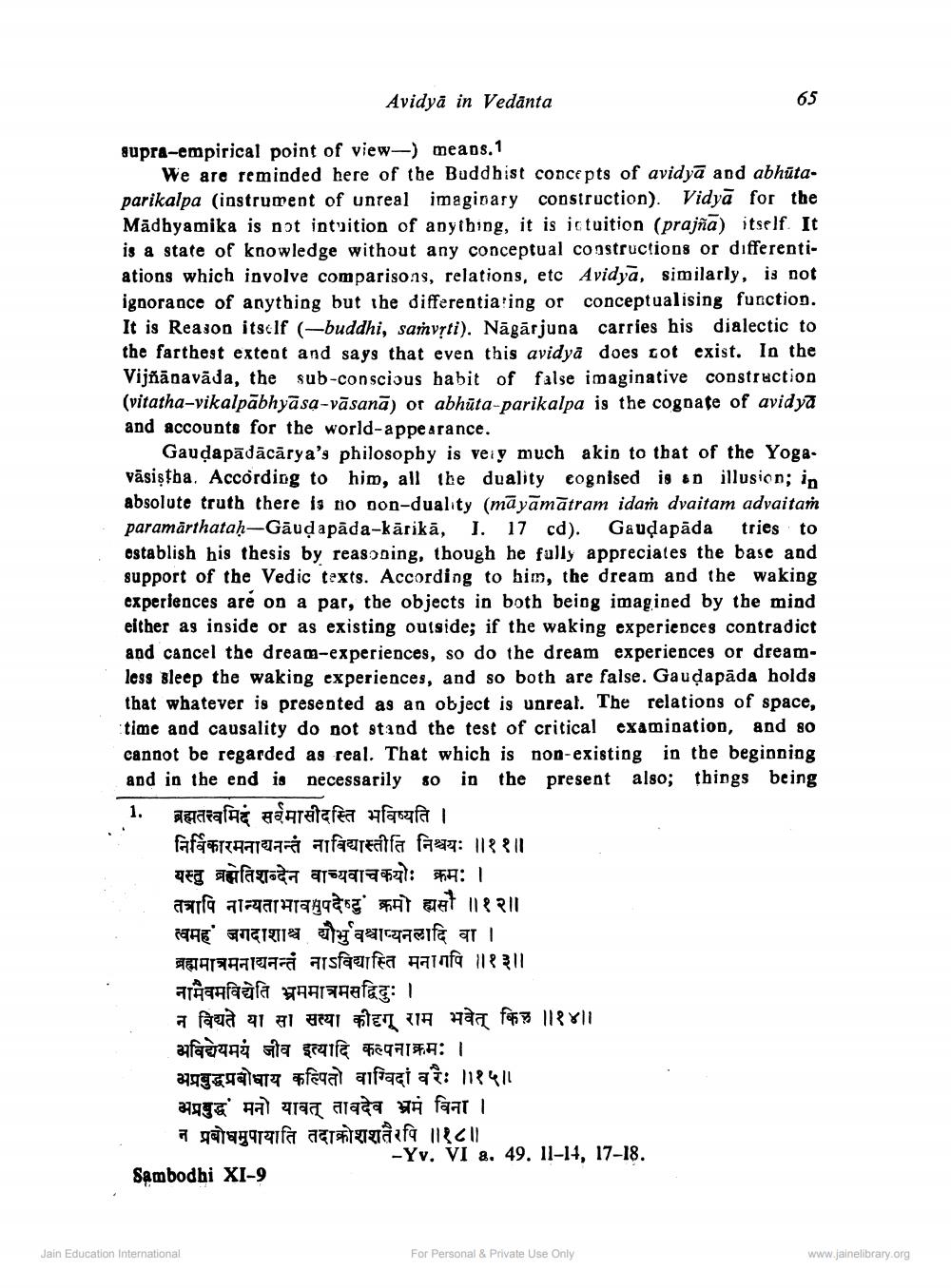________________
Avidyā in Vedanta
65
supra-empirical point of view-) means.1
We are reminded here of the Buddhist concepts of avidyā and abhūta. parikalpa (instrument of unreal imaginary construction). Vidyā for the
Madhyamika is not intuition of anything, it is intuition (prajna) itself. It is a state of knowledge without any conceptual constructions or differentiations which involve comparisons, relations, etc Avidya, similarly, is not ignorance of anything but the differentiating or conceptualising function. It is Reason itself (-buddhi, samvrti). Nagarjuna carries his dialectic to the farthest extent and says that even this avidya does cot exist. In the Vijñānavāda, the sub-conscious habit of false imaginative construction (vitatha-vikalpabhyasa-vasana) or abhita-parikalpa is the cognate of avidya and accounts for the world-appearance.
Gaudapādācārya's philosophy is very much akin to that of the Yoga. vāsistha. According to him, all the duality cognised is an illusion; in absolute truth there is tio non-duality (māyāmātram idam dvaitam advaitam paramārthatah-Gaudapada-kārika, I. 17 cd). Gaudapāda tries to establish his thesis by reasoning, though he fully appreciates the base and support of the Vedic texts. According to him, the dream and the waking experiences are on a par, the objects in both beiog imagined by the mind either as inside or as existing outside; if the waking experiences contradict and cancel the dream-experiences, so do the dream experiences or dreamless sleep the waking experiences, and so both are false. Gaudapāda holds that whatever is presented as an object is unreal. The relations of space, time and causality do not stand the test of critical examination, and so cannot be regarded as real. That which is non-existing in the beginning and in the end is necessarily so in the present also; things being
ब्रह्मतत्वमिदं सर्वमासीदस्ति भविष्यति । निर्विकारमनाद्यनन्तं नाविद्यास्तीति निश्चयः ॥११॥ यस्तु ब्रह्मेतिशब्देन वाच्यवाचकयोः क्रमः । तत्रापि नान्यताभावमुपदेष्टु क्रमो ह्यसौ ॥१२॥ त्वमह जगदाशाश्च द्यौ विश्वाप्यनलादि वा । ब्रह्ममात्रमनाद्यनन्तं नाऽविद्यास्ति मनागपि ॥१३॥ नामवमविद्येति भ्रममात्रमसद्विदुः । न विद्यते या सा सत्या कीदृगू राम भवेत् किल ॥१४|| अविद्ययमयं जीव इत्यादि कल्पनाक्रमः । अप्रबुद्धप्रबोधाय कल्पितो वाग्विदा वरैः ॥१५॥ अप्रबुद्ध मनो यावत् तावदेव भ्रमं विना । न प्रबोधमुपायाति तदाक्रोशशतैरपि ॥१८॥
-Yv. VI 8. 49. 11-14, 17-18. Sambodhi XI-9
1.
Jain Education International
For Personal & Private Use Only
www.jainelibrary.org




